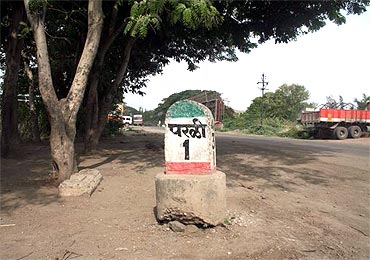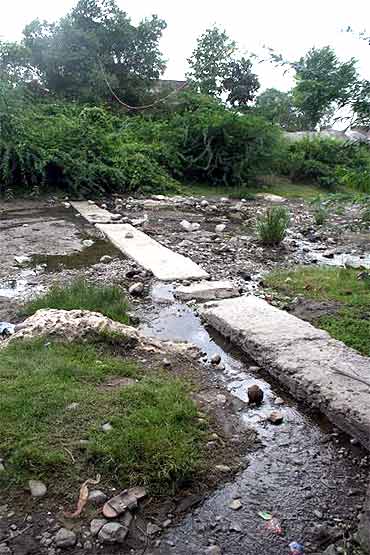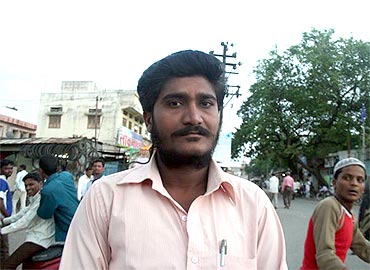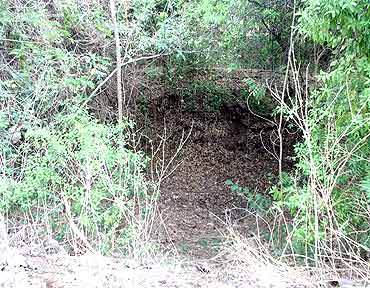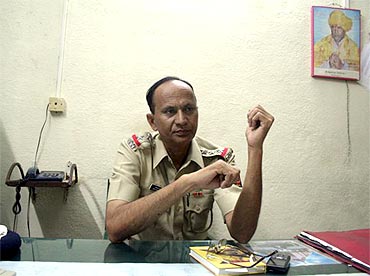 | « Back to article | Print this article |
Why did Dr Munde buy 2790 vials of abortion drugs this year?
Rediff.com's Prasanna D Zore and Uttam Ghosh visit Parli-Vaijnath in Beed district of Maharashtra, where the sex ratio has dipped to abnormal levels over the decade, and rampant female foeticide has created an atmosphere of revulsion among locals.
In a startling disclosure, Mirza Baig, the police officer investigating the Parli female foeticide case in Beed district of Maharashtra, told rediff.com that Dr Sudam Munde, a local gynaecologist in whose farm a five-month old female foetus was found by the police on June 18, purchased 2,790 vials of Vecredil, a medical drug used for abortion.
The entire amount was purchased in lots of 90s and 40s on various occasions between January 1 and June 18 this year.
The last purchase was made on June 18, the day on which the police discovered a female foetus in Dr Munde's farm.
Interestingly, this sale happened despite a crackdown by the district health officials who went on a drive to seal sonography machines (14 in all, including the one at the rural hospital, indicating that the police suspected sex determination could be happening at government-run hospitals as well) and suspended the licenses of six out of 12 abortion centres in the town that has a population of 1,25,000.
Apart from being Maharashtra's female foeticide capital, Parli is known as Bharatiya Janata Party leader Gopinath Munde's backyard, his former constituency and is now represented in the state assembly by his daughter Pankaja Palve.
Please click NEXT to read more..
Horror has gripped Parli's people
Baig said that Ganesh Medical Store, owned by Dr Munde and his wife Dr Saraswati and which was housed in the same premise as their abortion clinic, purchased 2,790 vials of Vecredil (trade name), from Pioneer Medical Agency, owned by one Mr Dube, a wholesale distributor of the drug in the heart of Parli, in a period of six months.
This disclosure by Baig further adds to the horror that has gripped Parli ever since some women first discovered a foetus lying in a nullah under Sangam bridge on the Parli-Beed highway at around 11 am on June 9.
The horror multiplied the next day when a few labourers working at a cement godown adjoining the nullah saw a woman draped in a punjabi suit, her face covered with a scarf, get down from a silver Innova car on June 10 at 9 am to throw a plastic carrybag in the nullah.
For the people of Parli, the doctor is a 'butcher'
When Balasaheb Gitte, the main complainant in the Parli female foeticide case, called the police, they discovered another aborted foetus wrapped in cotton and newspaper, neatly covered in a paper cardboard box.
Even as the investigations were on, Parli witnessed the discovery of a third foetus in the farm of Dr Munde on the morning of June 18. Acting on a tip-off, Baig and his team went to a small well in Dr Munde's farm and found the legs of the foetus popping out of a plastic carry bag.
A provisional post mortem report shown to rediff.com by the people in the know confirmed that all the three foetuses found on June 9, 10 and 18 were female. 'Non-viable female foetuses of 4-5 months age,' said the postmortem report signed by Dr Vijay Gore and Dr Wilekar, medical officers of the sub-district hospital.
It is in this charged atmosphere that the people in Parli have begun to call Dr Munde the 'Butcher of Parli'. While nobody yet knows that Dr Munde's Ganesh Medical stores purchased 2,790 vials of Vecredil, they recount his past record to justify their title for him.
"He has been doing this since 1995," charges a local, refusing to be identified. Locals who saw the lady throw the carry bag containing the female foetus in the nullah on June 10 said they often saw people throwing carry bags in the nullah over the last few months but never bothered to find out what it was, as it is a common practice in Maharashtra for people to throw garlands offered to deities into water bodies.
"Had it not been for the citing of the foetus by the womenfolk on June 9, we would not have bothered about the lady throwing the carry bag in the nullah on June 10," says a local who was also a witness to the act.
'We saw five dogs being fed foetuses'
In a related development, first class judicial magistrate Maheshwari Patwari on June 23 sentenced Dr Munde and his wife to 15-day magisterial custody under the Pre-Conception & Pre-Natal Diagnostics Techniques Act, 1994 but offered him bail in the June 18 case in which a female foetus was recovered from his well.
"We wanted Dr Munde's police custody to investigate whether the recent findings of foetuses was just a one-off phenomenon or he had used the complete stock of 2,790 vials to terminate female foetuses," said Baig, and added they will try to seek Dr Munde's police custody once his magisterial custody comes up for hearing on July 6.
Baig said he will hold talks with the deputy superintendent of police, Ambejogai, Swati Bhor, and the SP, Beed district, Dattatraya Mandlik and could appeal in a higher court for Dr Munde's police custody.
However, Munde's advocate Trimbek Golgher told rediff.com that his client has been sent to magisterial custody on charges of not maintaining proper abortion records and consent book under the Pre-Conception & Pre-Natal Diagnostics Techniques Act, 1994, and refuted the police charge that the investigators are in the custody of documents (receipts) that show that Dr Munde's store purchased 2,790 vials of Vecredil.
Lawyer Varsha Deshpande of the NGO, Ladki Lek Abhiyaan, who led a sting operation against Dr Munde and his wife's illegal sonography, sex determination and abortion centre in Parli last September, alleged that they saw four to five dogs being fed foetuses inside his clinic-cum-house in metallic vessels.
The locals, who stay in the vicinity of Sangam bridge, also said that dogs had been regularly visiting the nullah since the past six months "feeding on something" that they didn't bother to check.
The police, however, said these were mere stories and could not be taken cognisance of as nobody had reported this unusual behaviour of dogs.
Deshpande claimed that at least 90 women who they spoke to said they all had female foetuses in their womb, and were awaiting their turn to get aborted that day in September.
How Dr Munde and his wife were exposed
Explaining how she exposed the couple, Deshpande said she sent a five-month pregnant woman to Dr Munde's clinic for sex determination.
While Deshpande and another woman accompanying her were asked to wait outside the sonography centre, the pregnant woman was taken inside to determine the sex of the foetus.
Even though they could not capture the sting operation on video, the pregnant lady managed to quietly call Deshpande on the phone who then recorded the conversation between Dr Munde and the pregnant lady.
After the sonography test was done, Deshpande claims, Dr Munde told the pregnant lady there was good news for her as she had a baby boy and wrote '1b' which looks like '16' when written by hand, on her case paper.
On the contrary, he wrote '1g', which looks like '19,' on the case paper of another lady who also underwent the sex determination test.
When asked what these letters meant, Dr Munde refused to elaborate and asked Deshpande to pay Rs 500 as fees and take the pregnant woman to the local deity, Lord Vaijnath's temple, and distribute sweets.
Their hackles were raised when they heard him asking the other lady to deposit Rs 2,000 and go to the first floor of his clinic and wait for her turn.
"On further investigating the matter, we realised that all the women who were awaiting their turn for abortion had '19' or '1g' written on their case papers. Almost all of them were more than 12 weeks pregnant," she says.
"Later, we saw four to five dogs in his home-cum-clinic feeding on the aborted foetuses in metallic containers," she alleged.
When they brought the matter to the notice of local health officials and upon further investigations they realised that '19' stood for '1g' or one girl and '16' stood for '1b' or one boy in the womb.
The doctor, in his defence, said that 16 meant the foetus was 16 weeks old and 19 meant it was 19 weeks old.
"Isn't it strange that all those women in Dr Munde's clinic were either only 16 weeks or 19 weeks pregnant?" Deshpande asks.
"Though shocking, the whole incident reveals the mentality of our society," says Baig. "We need to change our moral and social fabric towards sex determination and female foeticide. No laws enacted to discourage such practices (gender determination and medical termination of pregnancy) will be effective till then," he added.
The Parli foeticides raise serious questions
It is in these circumstances that the whole episode of Baig and his team discovering the purchase of 2,790 vials of Vecredil in six months from one particular wholesale distributor raises serious issues.
Top-most among them being:
- Is it normal practice for a medical store to purchase abortion-fabient medicines in such large numbers?
- Why on earth would a gynaecologist purchase drugs used in medical termination of pregnancy on such a large scale?
- Will the government now ask the police to find out what exactly was happening inside Dr Munde's bungalow-cum-clinic?
- What were the local drug inspectors and administration doing when Vecredil was being purchased in such a large scale? How could it have slipped their routine inspection of the books of the distributor as well as Ganesh Medical Store?
- Or is there an understanding between those illegally determining sex and aborting more than 12-week old female foetuses and local health administration?
- Most crucial of all: Did Dr Munde use all those vials to terminate female foetuses?
The answer to these questions will be crucial in the days ahead even as Maharashtra Health Minister Ashok Shetty, guardian minister of Beed district Jaydutt Kshirsagar and local legislative assembly member Panakaja-Munde Palve meet district health officials to thrash out a workable solution to the menace of female foeticide.
In balance is Maharashtra's image as a progressive state, which has taken a beating. Just consider: Beed's sex ratio has dipped from 894 females for 1,000 males in 2001 to 801 females per 1,000 males under the age of six as per the 2011 census -- a drop of 10.4 per cent in a decade.
Interestingly, the Bombay high court on June 6 passed an order that all cases related to the Pre-Conception & Pre-Natal Diagnostics Techniques Act, 1994, should be resolved before December 2011 and has passed on the copy of the order to all the subordinate courts in Maharashtra, according to Ashok Tandle, prosecutor for Varsha Deshpande, in this case.
